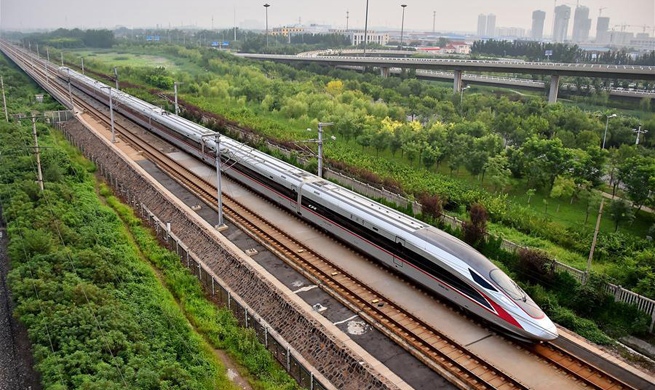by Farid Behbud
KABUL, Aug. 22 (Xinhua) -- Chinese aid to the education sector in war-torn Afghanistan has helped teachers and students to enjoy a better working and studying atmosphere that will eventually help them promote their knowledge and skills.
Despite tangible progress made in Afghanistan's education sector after the fall of Taliban regime in late 2001, students and teachers, however, still face a number of challenges including a lack of facilities and buildings in remote areas, as well as in the capital city of Kabul.
As the number of students and classes increase each year, there are not enough classrooms for students from different grades to have classes at the same time. Some schools' classes are oversubscribed to the point that more than 60 students have to attend a single class.
In early April, a Chinese construction company began work to build a new complex for the Afghan vocational and technical institute in Kabul, which belongs to Ministry of Education, the latest in China's continued assistance to Afghan education.
Prof. Aziz Ahmad Panshiri, a Kabul University lecturer, hailed China's contribution to the Afghan education sector over the past years, praising the measures taken by China as being significant to boosting higher education and vocational and technical studies in Afghanistan.
"We are looking forward with optimism to the continued cooperation from the friendly country of China and have no doubt that the recent Chinese funded project to build the vocational and technical institute of Afghanistan will have a positive impact on the quality of the country's education for the Afghan youth," Panjshiri told Xinhua recently.
"Moreover, collaboration in the areas of higher education between research institutions of China and Afghanistan has been growing recently. The relations between Afghan educational institutions and Chinese universities will continue to expand as the two sides have been trying to improve them," he noted.
"As per the government's plan to overcome all challenges facing the quality of the education system, work on the China-backed National Vocational and Technical Institute of Afghanistan project has been ongoing and the construction has progressed by nearly 20 percent," Najibullah Ali, a project manager of China Railway Construction Corporation Limited, which is in charges of building the complex, told Xinhua recently.
The Executive Bureau of International Economic Cooperation of the Ministry of Commerce of the People's Republic of China and the Afghan Ministry of Education signed the agreement for construction of the institute in June last year.
Panjshiri was of the view that China, with its longstanding historical relations, dating back some 2,000 years with Afghanistan, can do more for the conflict-hit country in many fields, particularly in capacity building areas relating to Afghan youths, such as assisting educational entities and providing scholarships to Afghan students.
According to the Afghan education ministry, the institute has been designed to have two teaching buildings comprising 65 classrooms, which will cater to up to 1,720 students. The overall project, which is the largest vocational institute in the country, contains classrooms, laboratories and administration facilities, as well as a gymnasium and a dormitory.
The project is expected to be completed by early 2019 and the total price of the project has been provisionally estimated to reach about 35 million U.S. dollars, which will be provided by the Chinese side, he added.
Arefa Hashimi, a Kabul University student, also praised China's contribution in boosting Afghanistan's education system, saying the implementation of such projects, particularly the ongoing project at Kabul University and the construction of vocational and technical institutes is vital for the betterment and advancement of Afghan students."
"The project will help the Afghan youth to increase their capacity on one hand, and on the other, to improve the economic situation of the country," Hashimi said.
Prior to 2002, up to 1 million students, mainly boys, attended general schools, but nowadays more than 10 million Afghan children, of which 40 percent are female students, are enrolled.
At the same time, however, more than 1.3 million school-age children have no access to education due to poverty, conflicts and insurgency.

















